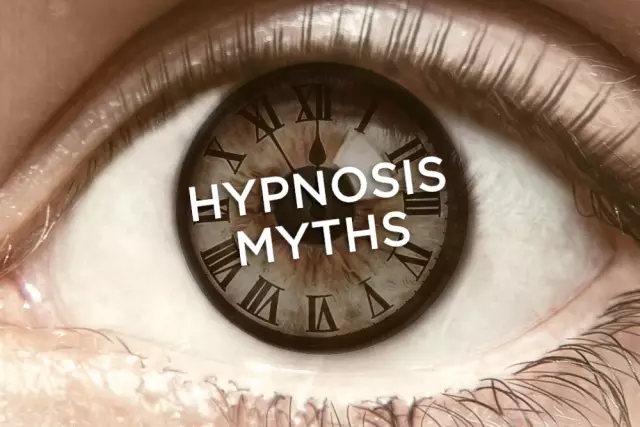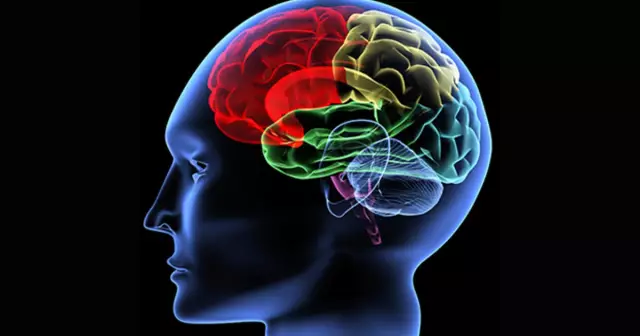- Author Rachel Wainwright [email protected].
- Public 2023-12-15 07:39.
- Last modified 2025-11-02 20:14.
10 myths about hypnosis
The practice of hypnotic influence on human consciousness has been around for about two millennia. During this time, scientists managed to learn a lot about the phenomenon of hypnosis and learned with its help to ease the condition of patients suffering from severe ailments.
Nevertheless, most people who are not directly related to medicine continue to share no less ancient misconceptions than the method of hypnotherapy itself. Today we will dispel the most common myths about hypnosis.

Source: depositphotos.com
Hypnotists use external forces
200-250 years ago, even the most successful and talented hypnotherapists really believed that they put people into a trance state with the assistance of some mysterious external forces. In the early 19th century, scientists discovered that the hypnotherapist was not the root cause of trance. The specialist only helps the patient to concentrate attention, using the techniques developed over the centuries, and the person falls into a hypnotic state on his own.
The conclusion is confirmed by the fact that in order to master the skills of hypnosis, a person should not have any exceptional abilities. Of course, some people learn the practice of hypnotherapy more easily and apply it more successfully than others, but this applies to any area of human activity.
In a state of trance, a person follows any instructions from the hypnotist
The idea of the unconditional controllability of a person subjected to hypnosis originated on the basis of theatrical shows conducted by not entirely conscientious hypnotists, circus performances or films. In fact, in a trance state, a person is fully aware of what is happening. The hypnotist cannot force the patient to take actions that are in conflict with his moral and ethical principles or a sense of self-preservation. Stories about how a hypnotized person jumped out of a window or robbed a bank is just absurd fiction.
After careful study, the claims that in a trance state a person blurts out all secrets turned out to be untenable. That is why hypnosis has never found application in forensic science: information obtained from hypnotized witnesses or suspects is often unreliable.
Hypnosis is a strange and unusual condition
There is nothing exceptional about hypnotic trance. Every day, each of us plunges into a similar state for a few minutes. This can happen during a trip in transport (a person turns off slightly, thoughtlessly looking out the car window), listening to music, reading an interesting book, etc. We think that at such moments we are just dreaming or thinking, but in fact, the state of our brain is very similar to the one that occurs under hypnosis.
After coming out of a trance, a person does not remember his actions
Most people remember the events that happened to them during the hypnotic session. Sometimes a person forgets about some of their actions during a trance, but memories are easily restored.
Skills of exceptional strength can be mastered under hypnosis
At this time, the patient's attention is maximally concentrated. He is really capable of actions that in reality presented a certain difficulty for him. In addition, hypnosis helps to liberate oneself and to do what in the usual state a person does not dare or hesitate to do.
In this case, we are not talking about some kind of awakening of superpowers, it is just that it makes it easier for the patient to do what he is capable of in ordinary life.
The practice of hypnosis is originally pagan and therefore condemned by the church
The delusion is associated with the belief that shamans and some representatives of alternative medicine practice trance. Given that the hypnotherapist does not turn to the help of external forces and cannot subjugate the patient's free will, most world religions refer to the practice of entering a hypnotic trance without judgment. For example, the Roman Catholic Church recognized hypnosis as acceptable as early as 1847.
By itself, hypnotherapy carries no religious connotations. True, it is often used by representatives of totalitarian sects for unscrupulous purposes, but because of this, the method itself cannot be considered unethical.
Some people defy hypnosis
The only reason that creates the impossibility of introducing the patient into a state of hypnosis is severe brain damage. A trained hypnotherapist can help anyone concentrate and go into a trance, but the sensitivity to this kind of effort (hypnotizability) is different for everyone.
For a successful hypnotic session, active cooperation between a specialist and a patient is necessary, since it is impossible to put a person into a trance against his will.
A weak person is easy to hypnotize
A person's hypnotizability has nothing to do with his moral and volitional qualities. Here, rather, the ability to quickly concentrate attention, a rich imagination, developed imaginative thinking and high intelligence play a role.
It is easier for a specialist to put into a trance a person who is intelligent, widely educated and emotional if he wants to cooperate with the hypnotist and there is no bias against the method itself.

Source: depositphotos.com
Hypnosis does not affect the physiological state of a person
In the human body, under the influence of suggestion, changes occur that are not directly related to conscious brain activity. For instance:
- after the suggestion that the patient has drunk a lot of water, his urine flow increases and its density decreases;
- a patient who allegedly has eaten several tablespoons of sugar has an increase in blood glucose;
- when suggested that the patient sees a bright light, he has a pupillary reflex (pupils are narrowed).
Many phenomena of this kind are known and well studied. The presence of biochemical and physiological effects of suggestion is the basis of the practice of using hypnosis for anesthesia, including in abdominal operations. Of course, drug pain relief is easier, more accessible, and cheaper. Hypnotic anesthesia cannot be applied en masse, both because of the shortage of hypnologists with a sufficiently high qualification, and because of the different susceptibility of people to hypnosis. Nevertheless, the possibility of using trance during surgical operations makes it possible to provide assistance to people for whom anesthesia is contraindicated.
Do not forget that many bodily ailments actually have psychosomatic causes, and serious illnesses are often accompanied by a decrease in the emotional background. Hypnotherapy is invaluable in treating these conditions, relieving thousands of patients from suffering.
The patient is at high risk of not getting out of trance
Not a single case is known where a hypnotized person would be "stuck" in a trance state. If the hypnotist does not forcibly stop the session, the patient after a while returns to the state of wakefulness on his own or falls asleep in a completely ordinary, normal sleep.
There are many exotic myths about hypnosis. In fact, this is a completely safe method of influencing consciousness, capable of helping a person in many situations.
YouTube video related to the article:

Maria Kulkes Medical journalist About the author
Education: First Moscow State Medical University named after I. M. Sechenov, specialty "General Medicine".
Found a mistake in the text? Select it and press Ctrl + Enter.






